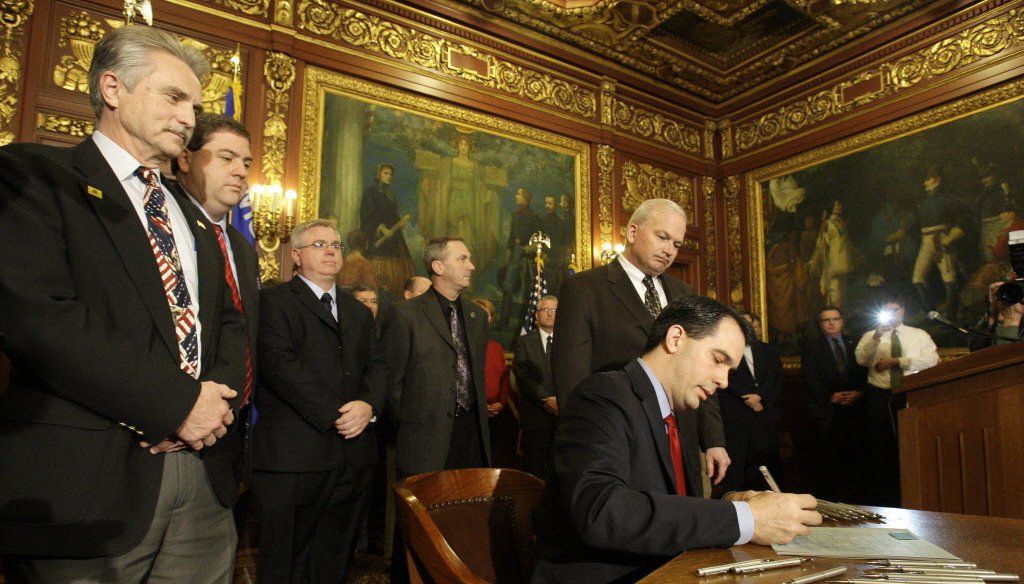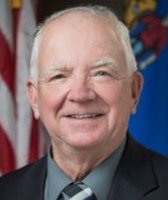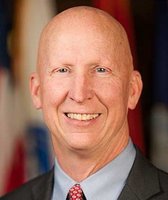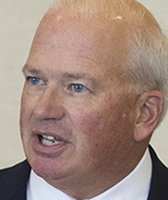Stand up for the facts!
Our only agenda is to publish the truth so you can be an informed participant in democracy.
We need your help.
I would like to contribute

Wisconsin Gov. Scott Walker is surrounded by supporters March 12, 2011, as he signs Act 10 at the Wisconsin State Capitol. (Gary Porter/Milwaukee Journal Sentinel)
Even with the hindsight of 2020, Act 10 stands out as one of the most unique and polarizing moments in Wisconsin history.
Ten years ago this month, tens of thousands of protesters packed the State Capitol daily, pushing back against then-Gov. Scott Walker’s plan to limit union power as a fix to government fiscal woes. Ultimately, Walker and Republicans approved the landmark legislation in March 2011, curtailing unions’ collective bargaining rights and widely increasing the share of health and pension contributions made by employees.
The political fallout was immediate: Recall attempts were launched against Walker and 13 Republican senators, with three Democrats winning Senate seats. But the debate over the nature and impact of the Act 10 reforms continued for years.
Here, we look back at an array of claims that grew out of the Act 10 debate.
Claim: Wisconsin Gov. Scott Walker’s estimate of a $3.6 billion state budget deficit is "manufactured" and a "bogus figure."
Speaker: Mark Pocan, Democrat (then a state representative, now a U.S. congressman)
Date: February 2011
This claim gets to the core of the Republican defense of Act 10 — that the state’s fiscal situation was so dire that drastic action had to be taken. Pocan, then co-chair of the Legislature’s budget-writing committee, said the deficit was actually between $1.5 billion and $2 billion for the upcoming 2011-13 budget. He accused Walker of creating a crisis.
We found this projected budget wasn’t particularly unusual, as former Gov. Jim Doyle had estimated a $3.2 billion deficit heading into 2003-2005, and at least $5.4 billion heading into 2009-2011. We also found outside experts agreed that Walker’s estimate was a realistic measure of the challenges facing him as he took office.
Claim: "While Act 10 allowed (Milwaukee County) to save some money, it was millions short of what we needed to fill the hole left by the $28 million cut in state aid."
Speaker: Chris Abele, Democrat (then Milwaukee County executive)
Date: April 2012
Abele pushed back against Walker’s oft-repeated assertion that his Act 10 collective bargaining reforms would offset cuts in state aid, saying Milwaukee County was a net loser in the exchange — to the tune of $6.7 million. Walker meanwhile claimed Milwaukee County had come out $10 million ahead.
Most of the differences in accounting were due to the governor claiming credit for changes already made by the county in advance of the Act 10 reforms. We found Abele was correct that the changes the county made under Act 10 reforms did not completely make up for the lost revenue, but that was because the county failed to take full advantage of Walker’s law.
On balance, we rated Abele’s statement Half True.
Claim: "Already in Wisconsin we have seen fewer people pursuing education as a career" due to the Act 10 collective bargaining law.
Speaker: Mary Burke, Democrat (then gubernatorial candidate)
Date: April 2014
There was an element of truth here, as the number of students pursuing a career in education had declined since Act 10’s adoption.
But that correlation doesn’t prove that Act 10 caused the drop. In fact, the Wisconsin trend predated Act 10 and coincided with a national drop in students in teacher training. And education-school leaders offered a host of other possible explanations for the fall-off.
We rated this claim Mostly False.
Claim: Says "Act 10 reforms" have "saved the taxpayers some $3 billion."
Speaker: Scott Walker, Republican (then Wisconsin governor)
Date: July 2014
Three years after the enactment of Act 10, Walker boasted of big savings from the legislation.
We confirmed that requiring most state and local government employees to contribute more to their pensions had saved public employers more than $3 billion at that point, including $2.35 billion in pension costs.
But this claim overreached a bit since those costs weren’t simply eliminated. They were taken on by public employees, who are also taxpayers.
We rated the statement Mostly True.
Claim: Hitler "abolished unions and that’s what" Wisconsin Gov. Scott Walker is "doing today."
Speaker: Lena Taylor, state senator, D-Milwaukee
Date: February 2011
This was exaggerated from every angle. Walker did not propose abolishing any unions, though it did prohibit some government workers from joining unions and it curtailed the collective bargaining rights of most public employees.
This phrasing also asserts Walker could simply order these changes, when Act 10 in fact had to be passed by the Legislature. Hitler, by fiat, not only ended all collective bargaining, he abolished all unions, seized their funds and sent their leaders to concentration camps.
Taylor’s comparison was ridiculously extreme and earned our most extreme rating: Pants on Fire.
Claim: Even after collective bargaining reforms, most Wisconsin public employees "are still paying about 12 to 13 percent" of their health insurance premiums, while most state residents who work in the private sector "pay 20 to 25 percent."
Speaker: Scott Walker
Date: November 2013
The law did double, from 6% to 12%, what the vast majority of state employees pay toward health insurance premiums. That also applies to nearly 13,000 local government workers who get health insurance through the state. It didn’t mandate that level of employee payment for all public employees, but many schools and local governments followed suit in raising employee payments to around 10% to 12%, officials said.
On the private side, 2012 federal figures showed employees paid 22% of the cost of the health insurance premiums for single coverage and 24% for family coverage.
We rated this claim Mostly True.
Claim: "We gave every public employee in the state the freedom to choose whether or not they want to be in a union."
Speaker: Scott Walker
Date: March 2012
The governor got the crux of the new law right -- that state workers could opt out of paying dues and each year the unions would face a recertification vote. Some unions chose to fold rather than be subjected to the annual effort.
But Act 10 did not apply to police and firefighter unions, so the "every" descriptor used here was wrong.
We rated this statement False.
Claim: "Two-thirds of the people in Wisconsin strongly disagree with this idea of permanently taking away people’s rights to collective bargaining."
Speaker: Peter Barca, Democrat (then Assembly Minority Leader)
Date: June 2011
A poll conducted by one liberal group did show opposition around this number, but that was an outlier among an array of polls asking in slightly different ways what Wisconsinites thought of Act 10. And Barca exaggerated that poll’s findings.
Political scientist Charles Franklin (then at the University of Wisconsin-Madison, now at Marquette University), a nationally recognized polling expert, said the consistency of the various polls — he had compiled a list — is pretty good evidence that the ceiling for opposition was more realistically in the upper 50% range to 60%. He said the claim of two-thirds opposition was a stretch, in particular Barca’s assertion that two-thirds were "strongly" in that camp. No poll showed anywhere near that number chose the "strongly oppose" measure used by pollsters.
Claim: Says his political opponents "brought 100,000 protesters into our state."
Speaker: Scott Walker
Date: July 2015
Police estimated the largest crowds during the February 2011 protests were around 70,000, though they said crowds could have been as high as 100,000 since the spread made counting difficult.
But there’s no evidence all or nearly all were from outside the state.
There were people taking buses to Madison from Illinois, and no doubt some protesters came from other states. But we found no evidence that the vast majority of demonstrators came from outside of Wisconsin. Indeed, there was criticism of the number of public employees in Wisconsin who took off work to participate in the rallies, which in some cases shut down schools.
This wasn’t the first time we’d heard this claim from Walker, who in February 2011 told a blogger posing as conservative donor David Koch that "almost all" of the protesters were from outside of Wisconsin. We rated that claim False.
Claim: "Protesters caused $7.5 million in damage to the Wisconsin State House"
Speaker: Dan Kapanke, Republican (then a state senator)
Date: June 2011
This claim came in an email pushing back against an attempted Walker recall.
The same figure surfaced in March 2011 from Administration Secretary Mike Huebsch, but we rated that Pants on Fire when it turned out to be based on a single-page, handwritten estimate. When the state later paid an historic preservation architect to do a full assessment, he estimated the damages at $270,000.
Architect Charles Quagliana said the building essentially experienced three to five years of wear in a two-week period, citing unintended damage such as nicks and chips to stone, stains from skin oils, residue from tape used to hang signs and a few marker stains. But nothing close to $7.5 million.
That earned Kapanke the same rating as Huebsch: Pants on Fire.
Our Sources
Sources as noted












































